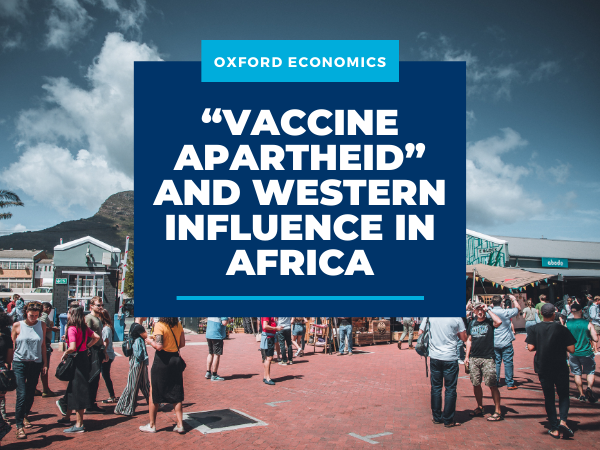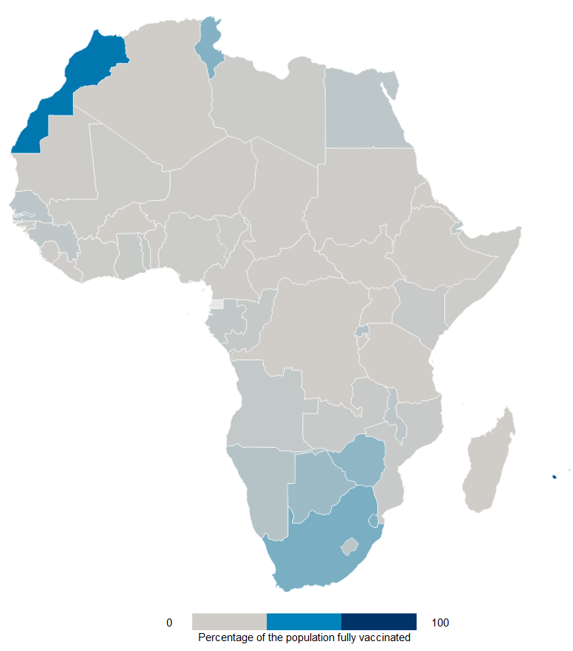Blog | 21 Sep 2021
“Vaccine apartheid” and Western influence in Africa

Francois Conradie
Lead Political Economist, OE Africa

“Since December 2020, the EU has exported 700 million vaccine doses to 130 countries worldwide,” European Union (EU) Commission President Ursula von der Leyen tweeted on August 31, and continued: “The EU takes its global responsibility seriously.”
The nobility of these sentiments was slightly diluted two days later, when Strive Masiyiwa, a Zimbabwean billionaire who is the African Union’s envoy to the EU, revealed that Ms von der Leyen had met South Africa’s President Cyril Ramaphosa the week before, and agreed to return doses of the Johnson & Johnson Covid-19 vaccine that it had imported from South Africa. That importation of 20 million doses while Africa was (and remains) the continent with the lowest vaccination rate was a public relations nightmare for the EU. It amplified the sharp-edged accusation of “vaccine apartheid” at a time when anti-Western sentiment in Africa, always present, has been showing signs of increasing further.

Source: Haver Analytics
To meet the global responsibility of which Ms von der Leyen spoke, the EU has promised a massive 200 million doses of Covid vaccines to the AU by the end of the year. In February Portugal announced it would ship one million doses—5% of its total stock—to its former colonies, of which five are African. On August 30 France pledged 10 million doses to Africa over three months. The US, meanwhile, has made similar promises: Washington announced in July that it would donate 25 million doses to Africa through Covax, the World Health Organisation (WHO)’s vaccine-sharing scheme.
These donations are welcome, of course, and will do much to speed up vaccinations in Africa from their current level—according to the Africa Centres for Disease Control (CDC), 104 million doses had been administered as of September 1, and 2.9% of the continent’s population had been completely vaccinated. But it is not lost on Africans that Russia and China were quicker to supply medicines than other nations.
The first vaccines to arrive in Egypt were from China; in April Cairo signed a deal with Russia allowing it to manufacture the Sputnik V vaccine domestically. Algeria received free vaccines from China in March, at a time when the US had only pledged to share vaccines with Mexico and Canada. Bridge Beijing estimates that as of September 6, China had delivered 56 million doses of vaccine to African countries, of which 9 million have been donations.
We expect to see Western countries step up the pace of their donations, if only because they have a glut of unneeded vaccines: Airfinity reckoned in early September that by the end of 2021, Western countries may have 1.2 billion doses they do not need. But in the post-Covid world, we also expect anti-Western sentiment to continue to increase. In places where Russia, especially, has been most successful at leveraging its diplomatic efforts into commercial advantage, the operating and investment environment will be unfriendly for Western corporates.
Tags:
You may be interested in

Post
Oxford Economics Expands Regional Presence with the Launch of Japanese Website
Oxford Economics, the world’s leading independent economic advisory firm, is excited to announce the launch of its new Japanese website. This important milestone reflects our ongoing commitment to broadening our presence in key regional markets and strengthening our ability to provide localised, high-quality economic insights to businesses and decision-makers in Japan.
Find Out More
Post
Oxford Economics Invests £2 Million in The Data City to Drive AI-Powered Business Intelligence
Oxford Economics is pleased to announce a £2 million investment in The Data City, a UK based cutting-edge real-time company classification platform.
Find Out More
Post
Oxford Economics Launches Megatrends Scenarios Service
Oxford Economics releases its first Megatrends Scenarios service, providing critical insights into the future of the global economy.
Find Out More